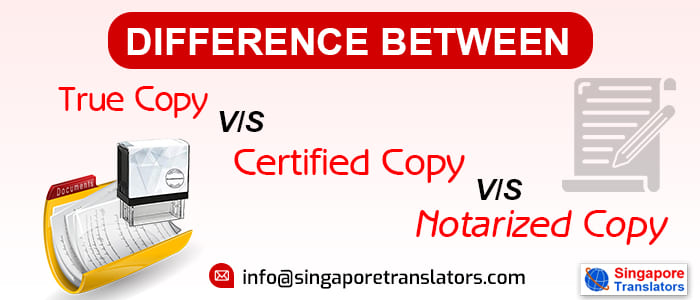As the world becomes a smaller place and more trades happen across borders, different documents will also be sent across borders, inevitably. In one country, how can a person know if a document from another country is sincere? Therefore, it may be appropriate to notarize and legalize documents originating from Singapore before you can use them abroad. To certify documents as legitimate for use within Singapore, notarization is also often necessary.

Both cases can also be known as having a “certified true copy.” The specific procedural criteria, however, depend on whether you need the document for use inside or outside Singapore. In this article, we will talk about the differences between true copy, certified copy, and notarized copy. So here we go:
What is the meaning of certified true copy?
A certified true copy meaning is a printout of a document containing a declaration made by an expert claiming that the original document has been seen, that the copy information matches the original, and that the photocopy is not changed in any way. When comparing a certified true copy vs original, the key difference is that the certified true copy serves as an authenticated replica, while the original remains the primary source document.
Get Fast & Accurate official notarization for ICA, MOM, MFA.
Characteristics:
- It gets approval in place of an original document by some government departments due to the extra work taken to create a certified copy.
- Certified translations are commonly in use in applications where the applicant does not receive the information given or where there is a need to send several documents to various government agencies.
- To show the authenticity of such documents, certified copies would also be the only acceptable translations of documents.
A notarized copy
A notarized copy meaning is a photocopy of an original document that has been approved as a real copy of the original. Notary stamps can be provided by a public notary or by the agency administering the certificate. Government agencies, courthouses, and attorneys offer Notary services.
Characteristics of Notarization:
Notarization certifies a document as a genuine copy of an original document or as a legitimate document that has been executed. The term “original copy meaning” refers to the process of verifying that a copy is an accurate and authentic representation of the original document.
- The notarization of documents is done by a public notary. A public notary is a person who gets approval under the Public Notaries Act. Moreover, a senior lawyer practicing in Singapore is a notary public.
- Documents are required to be notarized under two categories: Documents to be certified as genuine, for example, photocopies of academic transcripts, and ‘Authority’ documents that authorize someone to do something such as Power of Attorney.
Hire a Language translator for converting your legal & Other Documents.
A true copy
It is a document that doesn’t have any changes or modifications. To ensure that the copies are valid, correct, complete, and unmodified, true copies of original documents are necessary. However, most countries permit a public notary to certify a true copy of documents that are not recordable.
Difference between Certified, notarized, and true copy
“Interchangeably, Notarized Copy” and “Certified Copy” terms are used. The credibility of the original document does not get confirmed by a certified copy, just that the copy is a genuine copy of what seems to be the original public notary’s document. Of course, original records generate certified copies.
Certified copy v/s Notarized copy v/s True copy
| Certified copy | Notarized Copy | True Copy |
| Nominated person or agency asking for it signs it | Notary public signs it or put a seal on it. | A true copy is a document that doesn’t have any changes or modifications. |
| It is valid as long as the document is valid. E.g., a birth certificate or diploma is valid forever, a passport or driver’s license is valid until the document expires. | An Affidavit—a notarized statement that is, typically, an assertion of facts by the one signing it, to the best of his or her belief or knowledge. It has no expiry date. This type of documents includes depositions or be in use in the Court proceedings. They eventually become a part of the official records. | Birth certificate, marriage license, deed, court documents are recordable documents and usually should be obtained directly from authorities. On the other hand, a passport, green card are “non-recordable documents,” and you may obtain a true copy from a notary. |
Conclusion
It is essential to legalize or validate documents by certifying them or with the process of notarization. Not correctly ” certified true copy” documents can create problems further This can lead to substantial delays and not being able to enforce legal rights that are otherwise apparent.
If the party who has the notarized document is doing so on another’s behalf, such as a business owner, it may also contribute to legal liability for negligence. On a one-off basis, it is possible to get a notary public translation service to translate your notarized document.
We are the best professionals to offer accurate and fast and secure high court translation and transcription services. So, hire instant, best and cheap high court transcription services from the best and real-time transcription services from the professionals only at Singapore Translators.

